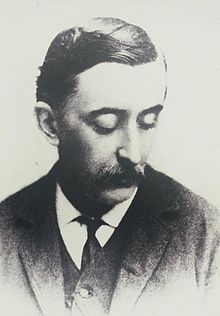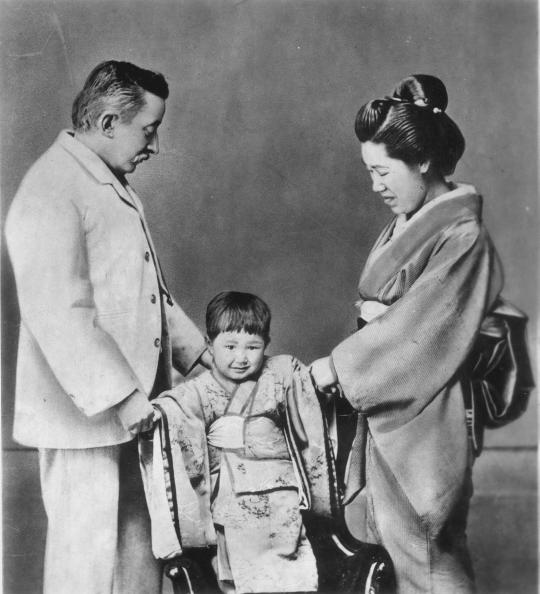 On this day (November 13) in 1894, Lafcadio Hearn published an editorial for the Kobe Shimbun. He’d taken a job there as a journalist following his unhappy spell teaching in Kumamoto. The editorial provides an interesting insight into his view of Shinto and gives the reader much pause for thought.
On this day (November 13) in 1894, Lafcadio Hearn published an editorial for the Kobe Shimbun. He’d taken a job there as a journalist following his unhappy spell teaching in Kumamoto. The editorial provides an interesting insight into his view of Shinto and gives the reader much pause for thought.
In a previous posting, it was pointed out that Hearn’s recent popularity owes much to right-wing commentators such as Hirakawa Sukehiro, emeritus professor of Tokyo University. It is indeed largely thanks to the Japanese scholar that Hearn has won renewed interest, and one aspect stressed by Hirakawa is Hearn’s very sympathetic portrayal of Shinto. It’s no coincidence that this comes at a time when Japan is under the sway of a nationalistic prime minister, Shinzo Abe.
So let’s look at Hearn’s editorial. He begins by taking a pot-shot at the Western missionaries he so despised, stating that they are ‘trying to persuade the Japanese that they must become converted to what zealots call Christianity’ (the phrasing is odd; only zealots call it Christianity?). Hearn claims the Christian enterprise is failing because Japan realises ‘the value of her own native religion.’ He then reveals his view of this ancient faith:
For Japan has a religion of loyalty, of love of country, of duty to the dead who founded her empire, of reverence to all who have shed their blood in defence of the land. By some this cult has been called the Spirit of Yamato, boy others the worship of ancestors, by missionaries (who understand nothing at all about it) ‘heathenism.’ It proclaims the heart of man as his guide to right action; and it proclaims that a true man’s duty is to yield up his life without hesitation rather than to fail in duty to his lord, his home, his honour, his Emperor, or his country. It commands obedience and it commands benevolence. It was the spirit of the ancient Samurai, and it is now the spirit of the disciplined soldier. …. Never did the zeal of Islam in any age produce more extraordinary results than the zeal of the old spirit of loyalty and patriotism produced in the making of New Japan.
Later in the editorial Hearn identifies the key trait of this ‘religion of loyalty’ – self-denial. What makes the Japanese particularly patriotic in his view is the subjugation of the self over long centuries, whether to family, community or country. These three layers were to form the essence of Hearn’s last, and for many people the greatest of his Japan writings, namely Japan: An Attempt at Interpretation (1904).
One of the recurring themes in Hearn’s praise of the Japanese is his admiration of their tendency for self-sacrifice. Hearn once told his Kumamoto students that being prepared to die for the emperor was their greatest duty, and in this passage from his editorial one can see the thinking that lay behind such a belief.
The value of the sentiment that moves a man to kill himself merely on being refused the chance of dying in battle for his country, or suffering the untold hardships of a winter campaign in a barbarous land, is not easy to over-estimate. To the Shinto soldiers, death in battle is a joy, a glory for all time; and any suffering possible to endure for the sake of country is welcomed as an honour and borne almost with a sense of gratitude. And behind all this splendid military spirit, is the spirit of the people, –supporting the army, making every possible sacrifice to secure it comfort and to lend it encouragement. This also is Shinto.
Hearn’s view of Shinto here ties in with the praise of ants he expressed in his writings, for the author idealised the insect for performing its duty in an orderly society reigned over by a benevolent monarch. For Hearn self-denial and self-sacrifice formed the basis of the ant’s morality. In fact, Hearn went once as far as to say that sacrificing one’s life was the greatest virtue possible regardless of the cause – an astonishing claim. In this I think Hearn was deeply misguided, and in a forthcoming paper entitled Lafcadio Hearn: A Flawed Genius I explain why.
It turns out then that the recent praise for Hearn by members of the rightwing Nippon Kaigi rests upon his view of Shinto as a religion of patriotism. There have been dramatic developments in the world since Hearn wrote his words over a hundred years ago; the rise and fall of State Shinto and European fascism might be thought to have changed the way we look at things, yet here we are with Hearn’s words back in fashion in certain circles. How very strange then that just as Shinto is being touted in the West as a nature religion with universal relevance, it’s being championed in Hearn’s adopted country as the very essence of Japaneseness!

By the time of the Kobe editorial, Hearn had already acquired a Japanese family and was distancing himself from the expatriate community

Leave a Reply